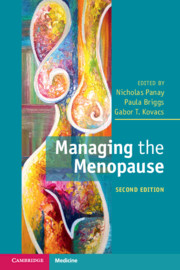Book contents
- Managing the Menopause
- Managing the Menopause
- Copyright page
- Contents
- Contributors
- Foreword
- Chapter 1 Physiology of the Menstrual Cycle and Changes in the Perimenopause
- Chapter 2 Clinical Features of the Menopause/Postmenopause
- Chapter 3 The Ovarian Reserve
- Chapter 4 Premature Ovarian Insufficiency
- Chapter 5 Premature Ovarian Insufficiency
- Chapter 6 Natural Hormone Replacement Therapy after Menopause by Ovarian Tissue Transplantation
- Chapter 7 Migraine in the Menopause
- Chapter 8 Psychological Aspects of the Menopause
- Chapter 9 Memory and Mood in the Menopause
- Chapter 10 Libido and Sexual Function in the Menopause
- Chapter 11 Vulvo-Vaginal Atrophy (VVA)
- Chapter 12 Pelvic Floor, Urinary Problems and the Menopause
- Chapter 13 The Effect of Menopause on the Musculoskeletal System
- Chapter 14 Hormonal Management of Osteoporosis during the Menopause
- Chapter 15 Cardiovascular Disease and the Menopause
- Chapter 16 Gynecological Pathology in the Menopause (Excluding Cancers)
- Chapter 17 Nutrition and Weight Gain in the Menopause
- Chapter 18 The Use of Estrogens and Progestogens in Menopausal Hormone Therapy
- Chapter 19 Androgen Therapy for Postmenopausal Women
- Cahpter 20 Contraception for the Perimenopausal Woman
- Chapter 21 Hormone Therapy and Cancer
- Chapter 22 Menopausal Hormone Therapy (MHT) and Venous Thrombosis
- Chapter 23 The Risk–Benefit Analysis of Menopausal Hormone Therapy in the Menopause
- Chapter 24 Selective Estrogen Receptor Modulators (SERMs) and Menopausal Hormone Therapy (MHT)
- Chapter 25 Non-hormonal Treatments for Menopausal Symptoms
- Chapter 26 Alternative Therapies for the Management of Menopausal Symptoms
- Chapter 27 Menopause in Primary Care
- Index
- References
Chapter 10 - Libido and Sexual Function in the Menopause
Published online by Cambridge University Press: 18 June 2020
- Managing the Menopause
- Managing the Menopause
- Copyright page
- Contents
- Contributors
- Foreword
- Chapter 1 Physiology of the Menstrual Cycle and Changes in the Perimenopause
- Chapter 2 Clinical Features of the Menopause/Postmenopause
- Chapter 3 The Ovarian Reserve
- Chapter 4 Premature Ovarian Insufficiency
- Chapter 5 Premature Ovarian Insufficiency
- Chapter 6 Natural Hormone Replacement Therapy after Menopause by Ovarian Tissue Transplantation
- Chapter 7 Migraine in the Menopause
- Chapter 8 Psychological Aspects of the Menopause
- Chapter 9 Memory and Mood in the Menopause
- Chapter 10 Libido and Sexual Function in the Menopause
- Chapter 11 Vulvo-Vaginal Atrophy (VVA)
- Chapter 12 Pelvic Floor, Urinary Problems and the Menopause
- Chapter 13 The Effect of Menopause on the Musculoskeletal System
- Chapter 14 Hormonal Management of Osteoporosis during the Menopause
- Chapter 15 Cardiovascular Disease and the Menopause
- Chapter 16 Gynecological Pathology in the Menopause (Excluding Cancers)
- Chapter 17 Nutrition and Weight Gain in the Menopause
- Chapter 18 The Use of Estrogens and Progestogens in Menopausal Hormone Therapy
- Chapter 19 Androgen Therapy for Postmenopausal Women
- Cahpter 20 Contraception for the Perimenopausal Woman
- Chapter 21 Hormone Therapy and Cancer
- Chapter 22 Menopausal Hormone Therapy (MHT) and Venous Thrombosis
- Chapter 23 The Risk–Benefit Analysis of Menopausal Hormone Therapy in the Menopause
- Chapter 24 Selective Estrogen Receptor Modulators (SERMs) and Menopausal Hormone Therapy (MHT)
- Chapter 25 Non-hormonal Treatments for Menopausal Symptoms
- Chapter 26 Alternative Therapies for the Management of Menopausal Symptoms
- Chapter 27 Menopause in Primary Care
- Index
- References
Summary
Loss of libido is the most common sexual complaint of women, often being a final common pathway of many sexual disorders. Estimates range from 30–45 per cent depending on the population sampled, highest in the postmenopausal age group [1]. However, the degree of distress associated with loss of libido may be minimal and therefore not sexually dysfunctional. Lack of arousal and orgasmic disorders are frequently correlated with loss of libido, as are sexual pain disorders. It is important for the medical doctor to help the patient decipher the chain of events and their impact, to facilitate change and improvement. Making assumptions about a particular set of expectations is likely to lead to neglect of key factors. In psychosexual medicine, listening and observing the patient’s expression of feelings can help to interpret the predominant issue(s) that may be resolved using brief psychotherapeutic intervention.
Information
- Type
- Chapter
- Information
- Managing the Menopause , pp. 98 - 104Publisher: Cambridge University PressPrint publication year: 2020
